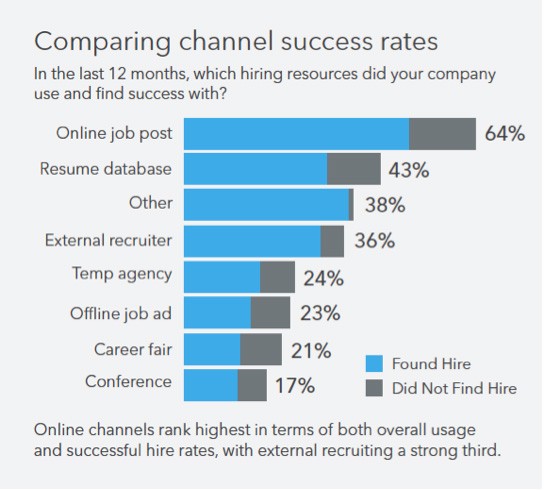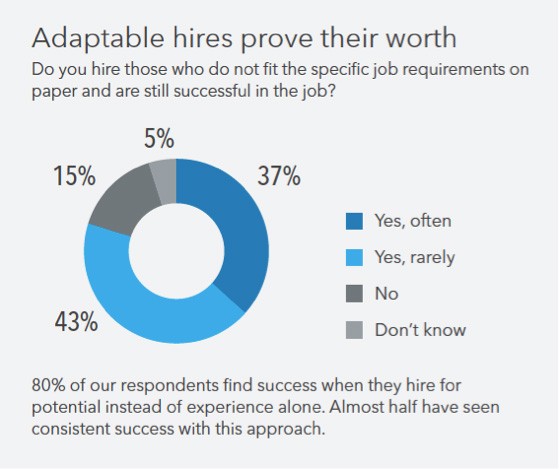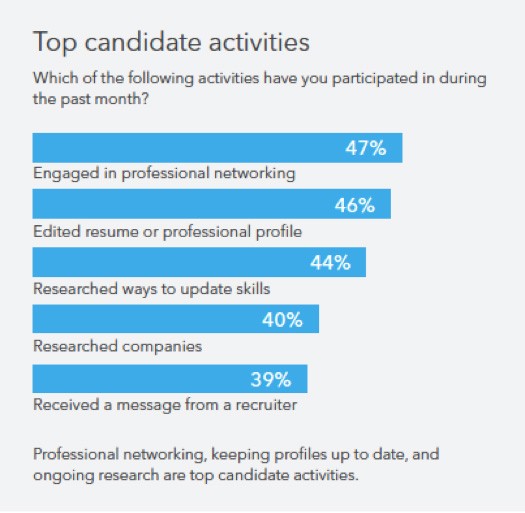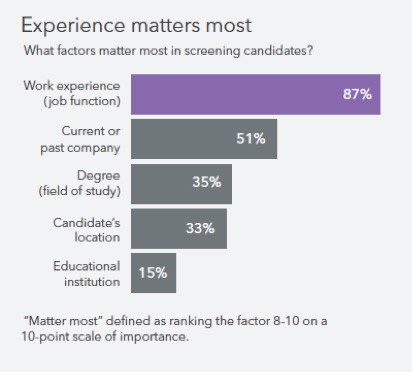5 Small Business Hiring Tactics You Should Know
When you hear the term “small business,” what comes to mind?
If you conjured the image of a quaint yet dilapidated corner store or an endearing young pastry chef taking her first batch of cupcakes out of the oven, it might be time for a serious reality check.
The “small” modifier in front of small business is a misnomer in many ways—there’s nothing tiny about the 23+ million small businesses in the United States that collectively contributed to over 50% of our national sales last year. Anyone who’s had the privilege of working at a small business (and I count myself in this category) can tell you—there’s nothing micro about the challenges, ambitions, and economic impact these businesses have.
So what are the hot tactics when it comes to recruiting for a small business?
We surveyed over 500 small business owners to find the answer to this question. Without further ado, let’s dive into what we learned:
Tactic #1: Use online channels to expand your reach with potential talent (post jobs and boost your talent brand).
When it comes to sourcing candidates, online channels take the cake. 64% of small businesses we surveyed are taking advantage of online channels like LinkedIn to find talent, and the majority are reporting great success.
The beauty of online channels is that you can showcase your brand without breaking the bank. You might need some serious dough to buy a TV commercial spot, but anyone with a smartphone can shoot a video showcasing employee culture, upload it to their LinkedIn Career Page, and share it across their (and their employees’) social networks.
Here’s a breakdown of how small businesses leverage online channels for recruiting:
Tactic #2: Remember the power of adaptable hires.
Larger corporations can get so wrapped up in a candidate’s accomplishments and accolades that they forget the power of potential. At LinkedIn, we call candidates who possess more promise and passion than a proven track record ‘adaptable hires’—and these candidates, unfettered by set-in-stone approaches, often end up transforming their companies.
Small businesses are leading the charge in hiring adaptable hires, with 80% reporting they “often” or “sometimes” recruit these types of candidates. Through recent graduate or veteran recruiting programs, small businesses are bringing in untapped talent and growing the leaders of tomorrow.
Here’s how small businesses approach adaptable hires:
Tactic #3: Never underestimate personal networks.
Small businesses seem to know better than anyone the power of personal connections. In fact, 75% of small businesses find their contractors and freelancers through their personal networks (whether that be via LinkedIn or a meeting over coffee, the old-fashioned way.)
Why are personal networks so powerful? First, they provide a cost-effective way to get the word out about the open position. It’s as easy as posting a job to LinkedIn and sharing it with your network. And if you want to exponentially increase its visibility, ask your team members and leadership team to share the job post as well.
Tactic #4: Reach out to passive talent – they are most likely interested.
Did you know that for every one active candidate who applies to your job opening, there are three passive candidates also interested? Whether it be via a catchy InMail or creative status update—savvy small businesses are tapping passive talent to increase their talent pool.
To back this claim with data, we asked passive candidates what kind of recruiting activities they engaged in during the last month, and here’s what we learned:
Almost half (47%) of candidates engaged in professional networking in the last month, and 40% researched companies of interest—which tells us that many professionals have one ear to the ground when it comes to finding new opportunities. Wouldn’t it be a shame to miss out on passive talent just because you didn’t reach out to start a conversation?
Tactic #5: Know what really matters when it comes to screening a candidate.
Screening candidates by the caliber of their degree may be an easy way to sort through a virtual pile of profiles, but it’s not always a wise approach for you, the candidate, or your business. Small businesses get it, with only 15% ranking “educational institution” an important screening factor. In contrast, small businesses prefer to screen based on work experience (87%) or a candidate’s past company history (51%).
Book-smarts are important, but the people who excel in the workplace bring more to the table—whether that be a knack for real-time problem solving, strong communication skills, compassionate teamwork, or unwavering positivity after an all-night brainstorm. These attributes make a great hire, and it’s not always indicative of where a candidate earned her degree.
The next time you’re looking for recruiting advice, reach out to an ambitious small business and be prepared to glean some invaluable food for thought. Or if you are a small business and have innovative recruiting tips to share, let us know at @HireOnLinkedIn.
Hungry for more? Watch our 30-minute webcast on How Small Businesses Hire: Top 2014 Trends Revealed.
* image by Department for Business, Innovation and Skills
Topics: Small business
Related articles








